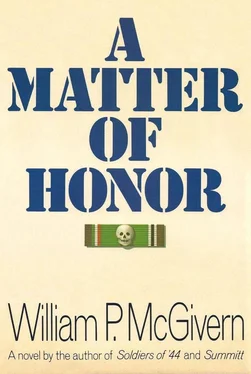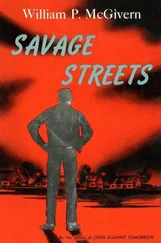Lasari turned his watch so he could see the dial in the half light. The sweat on his fingers made the watch feel cold and slick. Almost three and a half minutes left before he could step outside the latrine...
He felt like a man about to be executed, a victim without emotional reserves. In an attempt to regain control, he tried to think of memorable events in his life, events that would give some importance and stature to his life. But his mind was a blank. A cloudburst in Durham when he was a child, he remembered that. His mother had come into his room and hugged him. He was five. An old man in the minors, a kindly coach named Dingo who’d been chosen to tell him he was cut from the team — he remembered that man. But he couldn’t recall sunrises and sunsets, specific meals or music he’d enjoyed. He forced himself to think of Carlos and the checker games at Mrs. Swade’s rooming house and the way Bonnie Caidin’s lips had looked, moist and tinted, when she sipped the wine.
It seemed an unbearable moment, the life he’d led before this razor edge of time and what would happen to him when he went through the door. Then a poignant memory hit him, the moment Bonnie had told him about her dead brothers and the sadness that had linked them together then, a compassion and caring that was as endless as the universe itself, the moment of love. He tried to fix that moment in his thoughts, but his time was up.
The plan now seemed to have a life of its own, independent of Duro Lasari. Just outside the latrine a soldier stood in the shadows, a duffel bag at his feet, an unlighted cigarette between his lips.
“Here, Jackson,” the man said.
Lasari moved toward him, fumbling in his pocket for the book of matches from Teufel’s Atelier. The man put out his hand but Lasari stepped closer, struck a match and held it to the man’s cigarette.
The two men stood in the glow of the match, toe to toe, staring at each other, their frozen breath a floating halo to the scene. The stranger was young, no more than twenty, slightly built, sallow complexion and dark eyes, glistening now with alarm. The nails of the hand that held the cigarette to his lips were broken and seamed with dirt, almost the hands of a farmboy, and the tip of the little finger was missing.
The match burned short and Lasari dropped it to the snow. But in the brief light he had seen the markings on the soldier’s field helmet, the cerise oblong with the white three-quarters moon and single star of the Turkish flag. Lasari closed the book of matches and put it in his pocket.
With a sharp intake of breath the Turkish soldier dropped his cigarette and fled the rest area, leaving the duffel bag on the ground at Lasari’s feet.
Lasari quickly looked around. Snow flurries clouded the terrain but the immediate foot traffic seemed normal, the action routine. He picked up the duffel bag and walked to a clearing in the bushes behind the latrines, his boots moving with a whisper through the clean snow. With a second match he checked the outside of the duffel. It was marked in white stencil with the initials Pvt. G.J., followed by his Army ID number.
He unzipped the bag and felt through the folded GI garments inside, shirts, socks, shorts, a couple of wrapped gifts, a carton of cigarettes, shaving things. Then he tried to examine the lining, pinching the fabric, moving his lingers in a rubbing gesture. At first the material seemed coarse, almost felt-like, and then Lasari detected the sliding sensation of a substance between the layers of canvas, a movement like the shifting of fine sugar or powdered silk.
Lasari rezipped the bag, holding it on the ground between his ankles, his thoughts in a turmoil. From an inside pocket he took the small bottle of pills which Vayetch had given him in Heidelberg. He tossed the bottle on the palm of his hand. “... take three,” the man had said.
Lasari thought he heard a footstep to his left, but misjudged. The movement was behind him. Two things happened almost at once. A man’s arm circled him from the back, crushing his chest with such force that when the viselike grip was released, Lasari gulped and fought to take in breath. And at that moment a damp, bittersweet wad of gauze was pressed over his mouth and nose.
As he blacked out he heard a man say, “Your orders have just been changed, soldier.”
The queasiness wasn’t only in his stomach, Lasari decided, it was also at the base of his skull. There was a warm, almost fluid response in his spine, and he felt a sudden move might cause his head to disintegrate.
He tried to focus his eyes on the strange room. The ceiling was high beamed with a narrow balcony running around the second floor and a series of small doors that seemed to lead to bedrooms. A gray stone fireplace dominated the downstairs area, with two stuffed wild boars’ heads over the mantel, as well as a pair of old-fashioned wooden skis, carefully waxed and preserved, with red pompoms on the ankle straps. An unlit fire was laid in the grate and the room smelled of dampness and old leather.
The man had opened the windows of the Mercedes, but the night air did little to clear Lasari’s narcotic fog. He remembered sprawling in the back seat, half sick from the chloroform, fading in and out of consciousness. During the climb into the mountains high winds had been lulling, almost hypnotic, but the sharp turns in the road had sickened him and caused bile to rise in his throat. Once he had raised his head to see where they were going and glimpsed only giant pine trees, studded with upright cones, and then his mind slipped back into darkness.
Now he licked his lips in an attempt to speak and was repelled by the taste of the drug. His breathing was shallow and irregular, and when he tried to rub his numb cheeks his hands were chill and clammy.
“It’s cold as hell in here,” he said weakly from the armchair.
“You’re all right. We won’t be here long enough to burn a fire. Drink this tea.”
Lasari focused on the man’s voice and his vision cleared so he could make out General Tarbert Weir, the man from Philo Park, sitting at a table opposite him. A steaming mug sat on the table, along with the contents of Lasari’s pockets, including the vial of pills, the matchbook and American passport. The general was in full uniform and he had placed Lasari’s duffle bag in front of him, holding it firmly in place with a highly polished boot.
“You tried to kill me, didn’t you, you bastard,” Lasari said.
“That wasn’t my intention,” Scotty Weir said. “I gave you forty-five seconds on my pocket chronometer, then a few extra inhalations just to be sure. That was about an hour ago. Another sixty minutes or so of normal breathing, and you’ll have exhaled ninety percent of the anesthesia.”
“I can’t see right,” Lasari said.
The general struck a match and held it close to Lasari’s face. “Your pupils are still dilated, but you’re coming around.”
“Where are we?”
“Schwartzwald, an old ski lodge, a kind of mom-and-pop operation that went out of business when the big resorts were developed in the Zugspitz area. It’s an Army safe house, code name Case Ace Two. I have the key.”
“How far are we from where you picked me up?”
“In a direct line, down the old ski slopes, about six or eight miles, but taking the mountain roads, I’d say about thirty-five. We’re alone here, soldier, if that’s what you’re asking.”
“I thought I heard someone. I thought I heard a car.”
“A highway patrol passes on the main road once or twice a night, but you couldn’t hear it from here,” Weir said. He rose, slung the duffel bag on a couch and walked to a shuttered window, opening it a crack. He looked out over the snowy courtyard toward the parked Mercedes, pulled up against a windbreak hedge. There was one set of tire tracks coming in, then two sets of footprints approaching the front door. “It’s stopped snowing,” he said, “but there’s a lot of wind out there.”
Читать дальше












